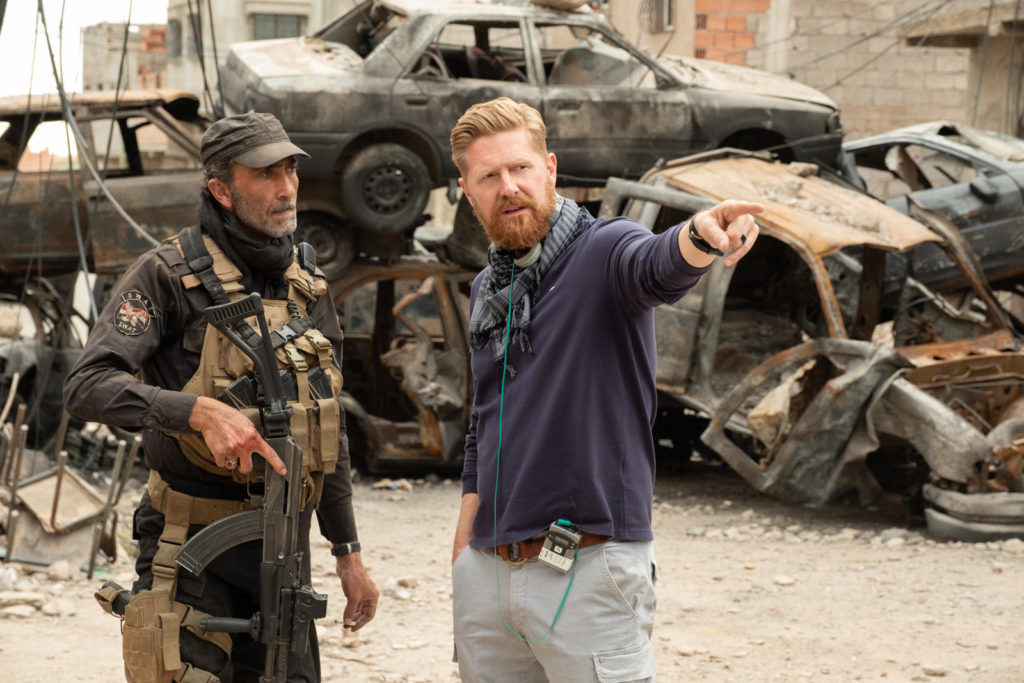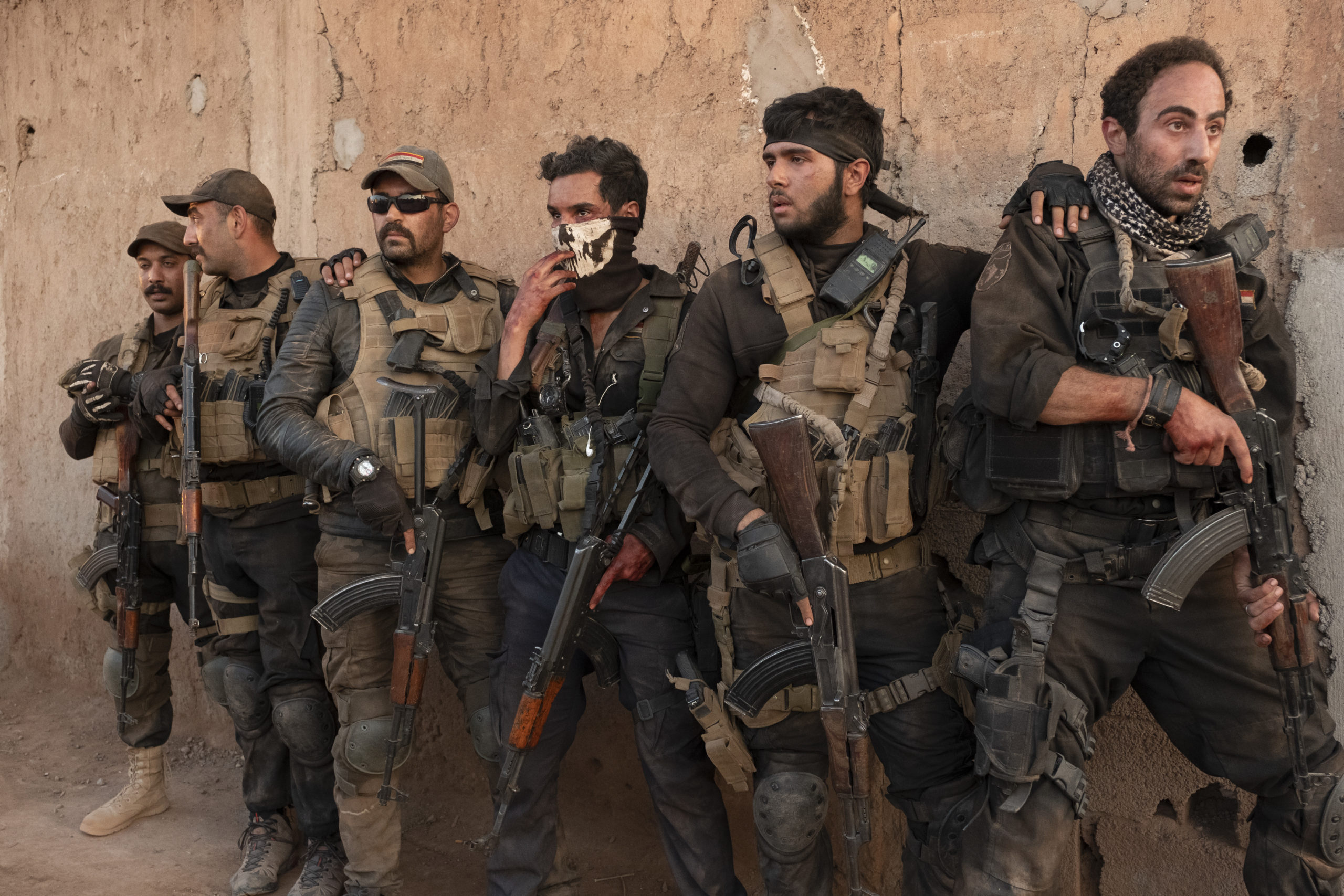In February 2017, The New Yorker published a long account of Ninewa province’s SWAT team as they fought the self-proclaimed Islamic State in the embattled city of Mosul, Iraq. Each SWAT member had endured personal tragedy at the hands of ISIS, and their mission was to take revenge against its remaining fighters. Luke Mogelson, the reporter, was unstinting in his granular portrayal of a beleaguered police force doing battle with the world’s most militarized terrorist organization. He also made a point, rare for a Western correspondent, of highlighting the explanatory context of the Mosul operation provided by his interpreter, award-winning news fixer Sangar Khaleel.
The dispatch was so compelling it attracted the attention of Anthony and Joseph Russo, the directors of the last two Avengers movies. They saw before them a script that didn’t require fictitious galaxies and superheroes – well, not the kinds endowed with supernatural abilities, anyway. This was an all too human tale of war, revenge, loyalty, love, and loss that deserved cinematic tribute. The Russo brothers’ production company, AGBO, produced the Arabic-language film adaptation of Mogelson’s piece, with screenwriter Matthew Michael Carnahan in his directorial debut. “Mosul” premiered on Netflix on Nov. 26.
I needed three days to finish reading The New Yorker article to encompass the chronicled journey of the SWAT team. I needed five hours to finish the film that runs one hour and forty one minutes to overcome the emotions that resulted from the realistic portrayal of the urban warfare that crippled the town I had lived in most of my life until seven years ago. “Mosul” is not about the battle to retake the Ninewa capital in its entirety. It doesn’t cover most of the battles or the various security forces that participated in the military operations but focuses on a specific story of locals. Carnahan did his homework, and the film succeeds in reflecting a distinct Moslawi (not Iraqi) perspective – not an easy undertaking, given that this city has often been indiscriminately defined by its association with ISIS.
“Mosul” is action-packed, with nerve-racking scenes that blur the lines between fiction and journalism. The film stayed true to the real-life events conveyed by Mogelson, with some additions meant to create a more coherent narrative or explain the backstory as to how Iraq’s second largest city fell to ISIS.
An inexperienced policeman named Kawa finds himself recruited on the spot by the SWAT team for an undisclosed mission. The young Kawa is Kurdish, as the movie tells us through another character in perhaps an allusion to Mosul’s diversity.
The real SWAT team included Kurds, Christians, Yazidis, and Shiites from Ninewa, but much like the city, it was predominantly Sunni Arab. The movie showcases this diversity another time during a prayer scene. Kawa initially struggles with the concept of vengeance – the Kurds were a major target of ISIS’s genocidal onslaught – but in no time hardens as the loss accumulates.
Many scenes challenge moral boundaries, such as when a SWAT team member rewatches the video of his brother’s beheading on his cellphone whenever he feels queasy about slitting an ISIS militant’s throat. Viewers opposed to capital punishment or the brutalizing effects of war may be horrified at such retaliatory bloodletting, but the film shows us that the SWAT members are facing no ordinary prisoners and there is no room for mercy. Iraqis, meanwhile, will hardly wince at battlefield summary justice, particularly as so many Western countries decrying Iraqi human rights abuses have declined to assume responsibility for the thousands of foreign fighters they produced who went on to join ISIS. France, for example, didn’t want to repatriate and prosecute its ISIS jihadists but then objected when Iraqi courts sentenced these French citizens to death. The SWAT team never tries to play at the Nuremberg tribunal; it’s too busy assuming the role of “Inglourious Basterds” of Mesopotamia.

Kawa soon realizes that not all is black or white and comes to terms with the fact that many of his former colleagues in the police force are traitors collaborating with the enemy. In reality, ISIS infiltrated local security forces through coercion or conviction. The betrayal in the policemen’s ranks was crucial for the successful ISIS blitzkrieg of Mosul in a matter of hours in June 2014. One scene showed the Federal Police accepting bribes from the SWAT team to allow their passage. The event was fictional but served to explain the thoroughgoing corruption in Iraq’s security forces throughout the country, a problem that persists in the post-ISIS era.
A few other scenes that were not included in The New Yorker’s account stood out. In one scene, a SWAT team member suggests requesting help from the Americans to bomb an ISIS training camp, but another member assertively rejects the idea, stating that all the United States did was bomb to destroy and would never help rebuild. The statement is an accurate description of the U.S. war plan laid out by Obama’s administration and continued by Trump’s. Finishing off ISIS in Mosul was the only objective without mere consideration to the thousands of Iraqi lives lost, civilians and military personnel alike. No U.S. assistance was allocated for rebuilding the infrastructure bombed by coalition planes during the fight, such as roads, bridges, hospitals, and even homes. The movie diverted from the more common theme of showcasing Americans as the heroes, and the production team that created “Captain America” should be applauded for that.
Finally, there was a confrontation between Maj. Jasem, leader of the Mosul pact, and Col. Esfahani, an Iranian commander who accompanies a unit of the Popular Mobilization Forces, the consortium of Shiite militias (many of them agents of Iran’s Quds Force) which stood up to fight ISIS. The dialogue intended to stoke sentiments of Iraqi patriotism by presenting an overdramatized portrayal of Iran’s inferior perception of Iraq’s history and identity. The movie showcased the United States and Iran as untrustworthy foreigners who looked after their interests while salting Mosul’s open wounds. It also reinforced the belief that Iraqis were alone in the fight and had no alternative but to stick with each other until the end.
In several scenes, Maj. Jasem picks up litter and disposes of it in the nearest garbage bin, reiterating his mission to rebuild the city. The “caliphate” has been destroyed, but rebuilding Mosul to resemble anything that it looked like before will require an entire population with the hearts and souls of the SWAT team. Maybe such a story will make a fitting sequel someday. Then again, maybe not.



